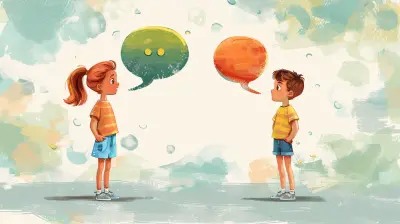Encouraging Curiosity: How to Get Kids to Ask More Questions
26 May 2025
Have you ever noticed how kids seem to have an endless fountain of “why’s” and “how’s” when they’re little? Their curiosity is their superpower—it’s what helps them figure out the big, wide world around them. But sometimes, as they grow older, that well of wonder starts to dry up. So, how do we keep that spark alive? How do we encourage kids to keep asking questions, even when the world seems to nudge them toward quiet conformity?
In this guide, we’re going to dive into some practical, hands-on ways to nurture curiosity in kids—not just for their benefit, but for ours too. After all, their questions can remind us to see the magic in the mundane, right?
Why Curiosity is a Big Deal
First things first—why is curiosity so important?Curiosity is like the engine that powers learning. It pushes kids to explore new ideas, test their boundaries, and chase their dreams. When they ask questions, they’re not just looking for answers—they’re building a mental roadmap of the world. Think of curiosity as their inner GPS, guiding them to new adventures and discoveries. Without it, they might just sit in neutral, missing out on all the fascinating twists and turns life has to offer.
What Stops Kids from Asking Questions?
Let’s get real for a second—kids aren’t born shy about asking questions. So, what changes? Why does that natural thirst for knowledge slow down?Here are a few culprits that could be stifling their inner detective:
1. Fear of Judgment
Nobody likes feeling embarrassed, especially kids. If they think their question might sound silly, they might keep it locked up tight instead of sharing it out loud.
2. Rushed Schedules
When life moves at warp speed, there’s not much room for questions, is there? Between school, activities, and family routines, curiosity can get lost in the shuffle.
3. Overemphasis on Answers
Ever notice how we often praise the “right” answer but skim over the effort behind the question? When answers get all the gold stars, kids might think questions don’t matter as much.
4. Screens Over Stories
With so much entertainment just a tap away, kids might not feel the urge to ask “What if?” or “Why does this work?” because Google’s got it all figured out for them.
7 Simple Ways to Get Kids Asking More Questions
Alright, time to roll up our sleeves. Here’s how we can spark a question-asking frenzy in our little ones.1. Be a Question-Asking Role Model
Kids are like sponges—they soak up everything we do. If they see you constantly asking, “Why does this happen?” or “How could this work differently?” they’ll follow suit. Imagine curiosity as a contagious yawn: once you start, they won’t be able to stop themselves.2. Celebrate the Questions, Not Just the Answers
When a kid asks a question, throw them a little party (metaphorically, of course). Shift the focus from “Was that the right answer?” to “Wow, that’s such a thoughtful question!” You’ll make them feel like their curiosity is what matters most.3. Turn Mistakes Into Mysteries
Did the volcano science project flop? Perfect! Instead of getting frustrated, ask them, “What do you think went wrong? What could we try next time?” Mistakes are just puzzles waiting to be solved.4. Play the “What If?” Game
This one’s a crowd-pleaser. Ask open-ended, outlandish questions like, “What if clouds were made of cotton candy?” or “What if dinosaurs were still around today?” It’s not about finding the right answer—it’s about reveling in the possibilities.5. Embrace the Awkward Pauses
You know those silent moments when a kid seems to be thinking hard? Don’t jump in to fill the space. Let the quiet linger. Sometimes, a great question is brewing, but it needs a little time to bubble up to the surface.6. Ditch the Overscheduled Life
If every minute of a child’s day is planned out, there’s no time to wonder. Build in some boredom. Yes, boredom! It’s like a blank canvas where curiosity comes out to play.7. Encourage Them to Challenge the Status Quo
Teach them to ask, “Why?” when faced with rules or traditions. Why do we always eat pancakes on Sunday mornings? Why can’t people breathe underwater? When they learn to question the world, they start to carve out their own unique place in it.
How to Handle the "Hard" Questions
I’ll be honest—some questions are tough. “Why is the sky blue?” or “Where do people go when they die?” can hit you like a curveball. But instead of dodging those questions, lean into them.When you don’t know the answer, say, “Wow, that’s a great question—I’m not sure! Let’s find out together.” This teaches kids that it’s okay not to have all the answers and that learning is a lifelong journey.
The Power of Open-Ended Questions
If you want kids to keep asking you questions, ask them some open-ended ones in return. Skip the “yes” or “no” variety and go for questions like:- “What do you think would happen if…?”
- “Why do you feel that way?”
- “How could we make this work differently?”
Instead of shutting conversations down, these questions crack them wide open, like a treasure chest of ideas.
Curiosity as a Family Bonding Tool
Here’s the thing—curiosity isn’t just for kids. The more questions they ask, the more you might start wondering about the world too. Why not make asking questions a family tradition? Share interesting facts you’ve learned, explore new hobbies together, or set up a “Question of the Day” at dinner. It’s a great way to connect while keeping everyone’s minds sharp.From Questions to Confidence
When kids ask questions—and get encouragement—they start to feel more confident in their ability to think critically. They learn that it’s okay to dig deep, challenge the norm, and stand out. They’re not just armchair observers anymore; they’re active participants carving their own paths. And if you ask me, there’s nothing more empowering than that.Don’t Forget the Magic of Wonder
At the end of the day, curiosity thrives on wonder. It’s about looking up at the stars and marveling at how far away they are. It’s about finding the extraordinary in the ordinary, like the way honeybees dance to share directions. Sometimes, it’s not about having all the answers—it’s about fostering that sense of awe that makes life so beautifully unpredictable.So, keep asking. Keep wondering. And most importantly, keep creating an environment where kids feel like their curiosity is celebrated, not stifled. Because who knows? One small question might just lead to a big discovery.
all images in this post were generated using AI tools
Category:
Communication With KidsAuthor:

Kelly Snow
Discussion
rate this article
3 comments
Juliana Kirkland
Loved this article! Encouraging curiosity in kids is so vital. Fostering an environment where questions are welcomed opens up a world of learning. Can’t wait to try these tips!
June 20, 2025 at 3:19 AM

Kelly Snow
Thank you! I'm glad you found the article helpful. Encouraging curiosity really does open up so many opportunities for learning!
Sloane McVeigh
Fostering curiosity is essential; it nurtures critical thinking and lifelong learning in kids.
June 5, 2025 at 4:50 AM

Kelly Snow
Absolutely! Fostering curiosity lays the foundation for critical thinking and a love for learning that lasts a lifetime. Thank you for your insightful comment!
Jane Reed
Thank you for this insightful article! Encouraging curiosity in our children can be challenging yet rewarding. I appreciate the practical tips and look forward to implementing them in our daily routines.
May 28, 2025 at 3:25 AM

Kelly Snow
Thank you for your kind feedback! I'm glad you found the tips helpful and wish you the best in encouraging curiosity in your children.



